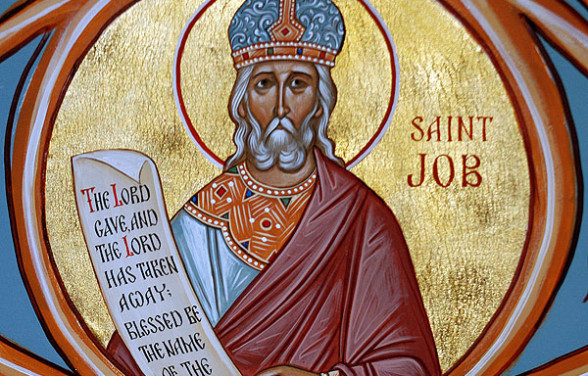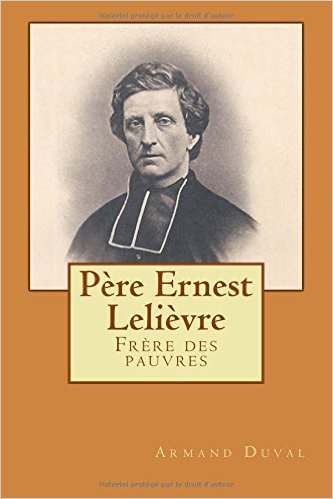16th Sunday after Pentecost

Saint Job the Long–Suffering
Already last evening, at First Vespers of Sunday, the Church, as is her custom during these Sundays after Pentecost, set before our eyes the figure who will accompany us throughout Holy Mass. Today we are given an icon of profound humility, a man of extreme patience in suffering, a model of abandonment to the will of God and of prayer: Saint Job the Long–Suffering. And so, in the fading light of Saturday, and on the threshold of this 16th Sunday after Pentecost, we sang:
Magnificat Antiphon
When Job heard the words of the messengers, he suffered it patiently, and said: if we have received good things at the hand of God, why should we not receive evil? In all these things Job did not sin with his lips. (Job 2:9)
The Eastern Churches keep the feast of Saint Job the Long–Suffering, also called Saint Job, the Prophet of the Resurrection, on May 6th. The Roman Martyrology names him on May 10th with the entry: “In the land of Hus, the holy prophet Job, a man of wonderful patience”. There have always been naysayers who question the historicity of the man Job, and who would prefer to see him as the fictional hero in a literary drama about the mysterious workings of Divine Providence. Saint Thomas Aquinas takes a dim view of such arguments.
But there were some who held that Job did not exist, but that this was a parable made up to serve as a kind of theme to dispute providence, as men frequently invent cases to serve as a model for debate. Although it does not matter much for the intention of the book whether or not such is the case, still it makes a difference for the truth itself. . . . In Ezechiel, the Lord is represented as saying, “If there were three just men in our midst, Noah, Daniel, and Job, these would free your souls by their justice.” (Ez. 14:14) Clearly Noah and Daniel really were men in the nature of things and so there should be no doubt about Job who is the third man numbered with them. Also, James says, “Behold, we bless those who persevered. You have heard of the suffering of Job and you have seen the intention of the Lord.” (James 5:11) Therefore one must believe that the man Job did really exist.
The Introit of the Mass gives us the substance of the prayer of Job; it is a kind of window into his soul through which we can perceive something of the humble piety and confidence that bound him to God, even in the face of unspeakable sufferings:
Introit
Have mercy on me, O Lord, for I have cried to thee all the day. For thou, O Lord, art sweet and mild: and plenteous in mercy to all that call upon thee. V. Incline thy ear, O Lord, and hear me: for I am needy and poor. (Psalm 85: 3,5, 1)
Job is a figure of Jesus in His Passion. Job is a model of a soul who proclaims the sovereign dominion of God and who, in deepest humility, submits himself entirely to all the dispositions of Divine Providence. In this lies the holiness of Job: trusting submission to Divine Providence.
 Renounce, Adore, and Submit
Renounce, Adore, and Submit
I am reminded of an episode in the life of Catherine–Mectilde de Bar: finding the burdens and vicissitudes of her life altogether too hard to bear, and wanting to disappear from the world and live as a hermit in the mountainous wilds of La Sainte-Baume in the south of France, Mother Mectilde wrote a note saying, “A religious named Catherine–Mectilde of the Holy Sacrament passed by this way: God has disposed of her. Pray God for the repose of her soul”. It is all deliciously romantic, but it was not what Divine Providence willed for Mother Mectilde.
In the luminous darkness of Holy Saturday night and the early hours of Easter 1651, while praying over the mystery of Christ’s death, entombment, and resurrection, God showed Mother Mectilde that abandonment to His Will is worth more than the most heroic aspirations to a life hidden in the solitude of a tomb. She saw that Jesus was not at all pleased with her plan to run away to La Sainte—Baume. Our Lord spoke to her, saying: “Renounce, adore, and submit to my designs”.
This, of course is where the holiness of Saint Job the Long–Suffering and the holiness of Mother Mectilde converge. This is where the holiness of all the saints converges: in unconditional abandonment to the dispositions of Divine Providence, even when these are disconcerting, apparently fraught with contradiction, and even crucifying.
The Collect of today’s Divine Office and Holy Mass gives us a most comforting assurance. All day long we shall pray, as we prayed at the beginning of this Holy Mass:
Let Thy grace, O Lord, we beseech Thee, ever precede us and follow us.
Being in the Right Place
One who makes this prayer, believing in what the Holy Ghost, through the liturgy of the Church, obliges us to say, cannot then “kick against the goad” and rebel against the dispositions of Divine Providence. He must begin to say, “If Thy grace, O Lord, goeth before me and followeth after me, and this in all the circumstances and changes of my life, I have nothing to fear, save my own unwillingness to trust Thy providence”. When life comes at me with disappointments, apparent failures, and losses, and when my imagination runs wild in a fit of the terrible “What Ifs?” — What if this happens? What if this other thing does not happen? What if I? What if he? What if she? What if they? Etc. — I find it helpful to say, over and over again:
My Jesus, only as Thou willest,
when Thou willest,
and in the way Thou willest.
To Thee be all glory and thanksgiving,
Who rulest all things mightily and sweetly,
and Who fillest the earth with Thy manifold mercies. Amen.
One who prays in this way, taking the last place, allows God to choose for him the right place. One who prays in this way, will begin to allow Our Lord to deploy His grace and manifest His munificence in all places and in all the circumstances of your life. Our Lord desires to heap blessings upon us. He asks only that souls renounce themselves, adore His Providence, and submit to His designs.
Struggles and Attacks
The Offertory Antiphon suggests that, even in the life of one resolved to submit to Divine Providence, there will be struggles and attacks coming from within and from without. The real battleground of the monk, as Cassian shows us, is the field of his own thoughts. And so, when distress strikes, we do well to repeat the Offetory Antiphon.
Be pleased, O Lord to deliver me. Let them be confounded and ashamed together, that seek after my soul to take it away. Look down, O Lord, to help me. (Psalm 39:14, 15)
Every Holy Communion can be, and should be, and must be an act of surrender to Divine Providence. One cannot receive the adorable Body of Christ and, at the same time, put oneself in the first place, saying, “Holiness, yes, my God, but Only as I will, and when I will, and in the way I will”. Holiness on one’s own terms is no holiness at all. It is rather a manifestation of the arrogance of the man who marches up to the first place and takes it for himself.
 The Wisest Calculation of All
The Wisest Calculation of All
In the Communion Antiphon, we are again given, I think, a window into the soul of Job. Can you not hear him saying it?
O Lord, I will be mindful of thy justice alone. Thou hast taught me, O God, from my youth: And unto old age and grey hairs: O God, forsake me not. (Psalm 70:16–17, 18)
Of this one thing we can all be certain: that the same God who has taught us from our youth — and in ways known only to His Providence — will not forsake us. How right he was, the holy 19th century French priest, who, reflecting on his own life, said:
I serve a Master who values the will of a sincere heart beyond any talent. My ignorance counts on His knowledge, my poverty on His wealth, my weakness, on His strength. And I know, and am perfectly certain that, of all the calculations I could make, the wisest is to abandon myself to Him. (Père Ernest Lelièvre, Auxiliary Priest of the Little Sisters of the Poor, 1826-1889)
